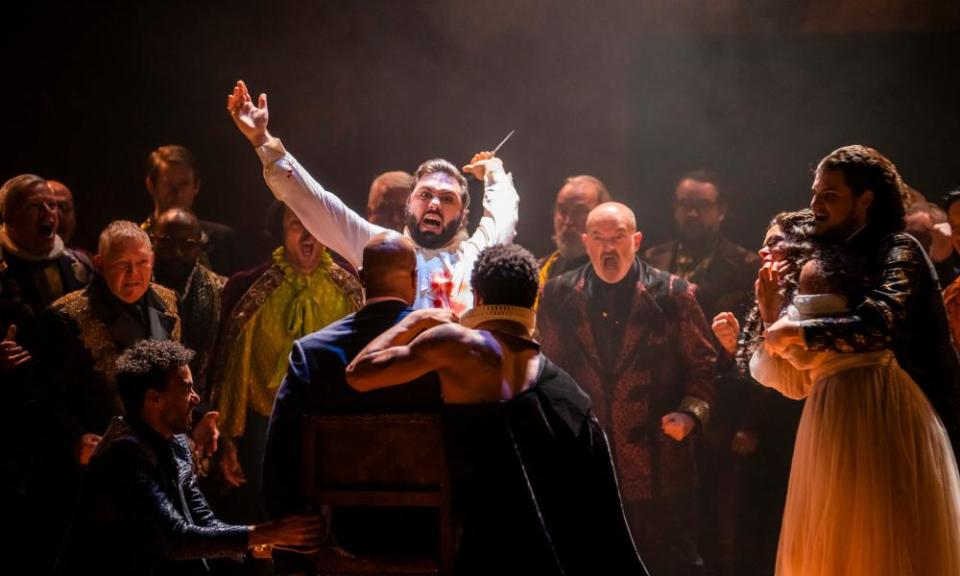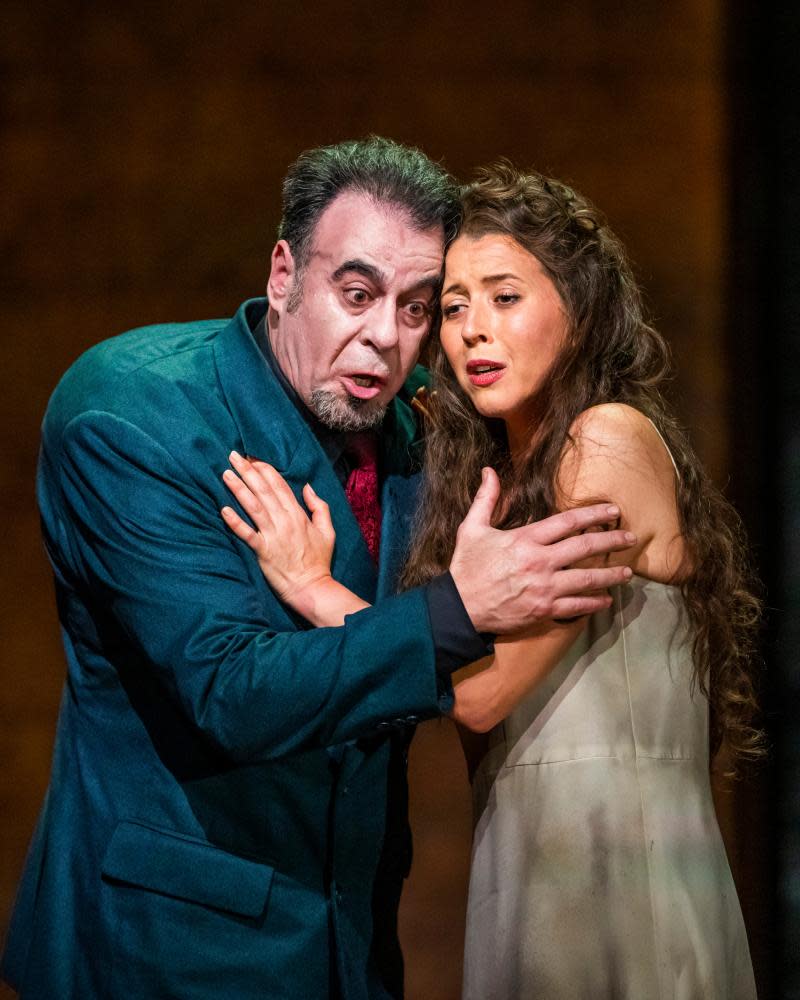Rigoletto; London Symphony Orchestra/Rattle – review

Titian’s seductive Venus of Urbino dominates the opulent court of the rapacious Duke of Mantua in the first act of the Royal Opera’s new production of Verdi’s Rigoletto. Later it’s replaced by the Rape of Europa by the same artist. We know that in real life the 16th-century duke was a noted collector – and that Charles I snapped up several bargains when Mantua hit hard times – but neither of these images were ever in Mantua, or indeed Caravaggio’s Martyrdom of St Matthew, seen in a subverted tableau as the curtain rises. No matter. The message is clear: the Duke views women as commodities, whether on canvas or cotton sheets.
This is director of opera Oliver Mears’s debut production for the Royal Opera, and, surprisingly, it’s the first time that the company’s music director, Antonio Pappano, has conducted Rigoletto in his two decades at Covent Garden. They make a solid partnership, producing a performance that serves the music admirably and rarely gets in the way of Verdi’s sweepingly dramatic score. Barring one act of gratuitous, singular cruelty, lifted from King Lear and introduced to underline Mears’s concept that the Duke is a dangerous psychopath, this is a remarkably straight production and obviously built to last, replacing David McVicar’s licentious staging, first seen in 2001.
The subdued reds and golds of Simon Lima Holdsworth’s set, which glow so atmospherically under Fabiana Piccioli’s lighting, suggest Renaissance Italy, but we could be anywhere, in any age. Into Mantua’s pitiless court comes the jester Rigoletto, who spits insults at any of the Duke’s detractors yet secretly loathes his job and his boss. Carlos Álvarez totally inhabits the role, his battered baritone as expressive as his wonderfully mobile, characterful face. He captures perfectly the mixture of anguish and tenderness that Verdi illustrates so vividly in his duets with his precious Gilda, the daughter he keeps hidden in suffocating solitude, an obsession that will have tragic consequences.

The Cuban-American soprano Lisette Oropesa, as Gilda, is the star of the evening, silvery-voiced and apparently fragile, and yet steely in her delusion that the satanic Duke really loves her. She sings Caro nome with an innocence that turns to knowingness, adopting the same posture as the Venus of Urbino as she lies on her bed – a pose neatly picked up later by the wanton Maddalena (an underpowered Ramona Zaharia) as she and Sparafucile (Brindley Sherratt, in tremendous form) plot murder.
The Armenian tenor Liparit Avetisyan, as the Duke, dispatches La donna è mobile with crisp efficiency. Elsewhere, however, he has a habit of pulling the tempo around, notably in his love duet with Gilda, but the ever-vigilant Pappano never lets him slide off the rails. Fine playing in the pit, particularly at the opening of Act 3, is complemented by incisive singing from the muscular all-male chorus. Grand opera is back with a bang.
One of the many things we are going to miss about Simon Rattle when he leaves his post as music director of the London Symphony Orchestra in 2023 (to be replaced by Pappano) is his unerring ability to make musical connections, to show us the golden thread that links music across the ages. He opened the LSO’s autumn season last week with a celebration of British music, brilliantly splicing Henry Purcell’s daringly emotional 1680 anthem Remember not, Lord, our offences with Michael Tippett’s regal 1962 fanfare Praeludium for Brass, Percussion and Bells.
The London Symphony Chorus, back after 18 months of Covid restrictions and yet banished to the upper gallery, sang the Purcell with impressive intensity before tackling the most eagerly anticipated music of the evening, two movements from Julian Anderson’s new work, Exiles. Scored for solo soprano, chorus and orchestra, it explores a subject absolutely fit for today: what it is to long for your homeland. With so many people displaced and disparaged, the music goes to the heart of the matter while also speaking powerfully to those who feel politically exiled in our own country.
In the first movement, the soprano Lucy Crowe sang the text of a poetic email sent by composer Ahmed Essyad, describing his wait for inspiration while a startling sun beats down on Morocco, a beautiful country he cannot enjoy because he is exiled amid a Covid lockdown. Anderson’s often delicately detailed orchestral writing shimmers with the translucent light of north Africa, while his perkily beautiful vocal line mirrors the bittersweet humanity of Essyad’s email.
There were occasional problems with pitch and balance when the chorus represented the exiled Israelites in Anderson’s setting of Psalm 137, “By the rivers of Babylon”. His lithe but restless music requires a precision that was sometimes lost by placing the chorus so far away, but this was still a fine world premiere, a tempting taster to the complete work. Crowe impressed again in Natural History, Judith Weir’s evocative settings of Taoist poetry, and in the final movement of Vaughan Williams’s elegiac Pastoral symphony, her plangent soprano floating across a landscape so cogently contoured by Rattle. Enjoy it all on Radio 3, 7.30pm on Friday 24 September.
Star ratings (out of five)
Rigoletto ★★★★
New Music Britain ★★★★
Rigoletto is in rep at the Royal Opera House, London, until 12 March, with cast changes

 Yahoo News
Yahoo News 